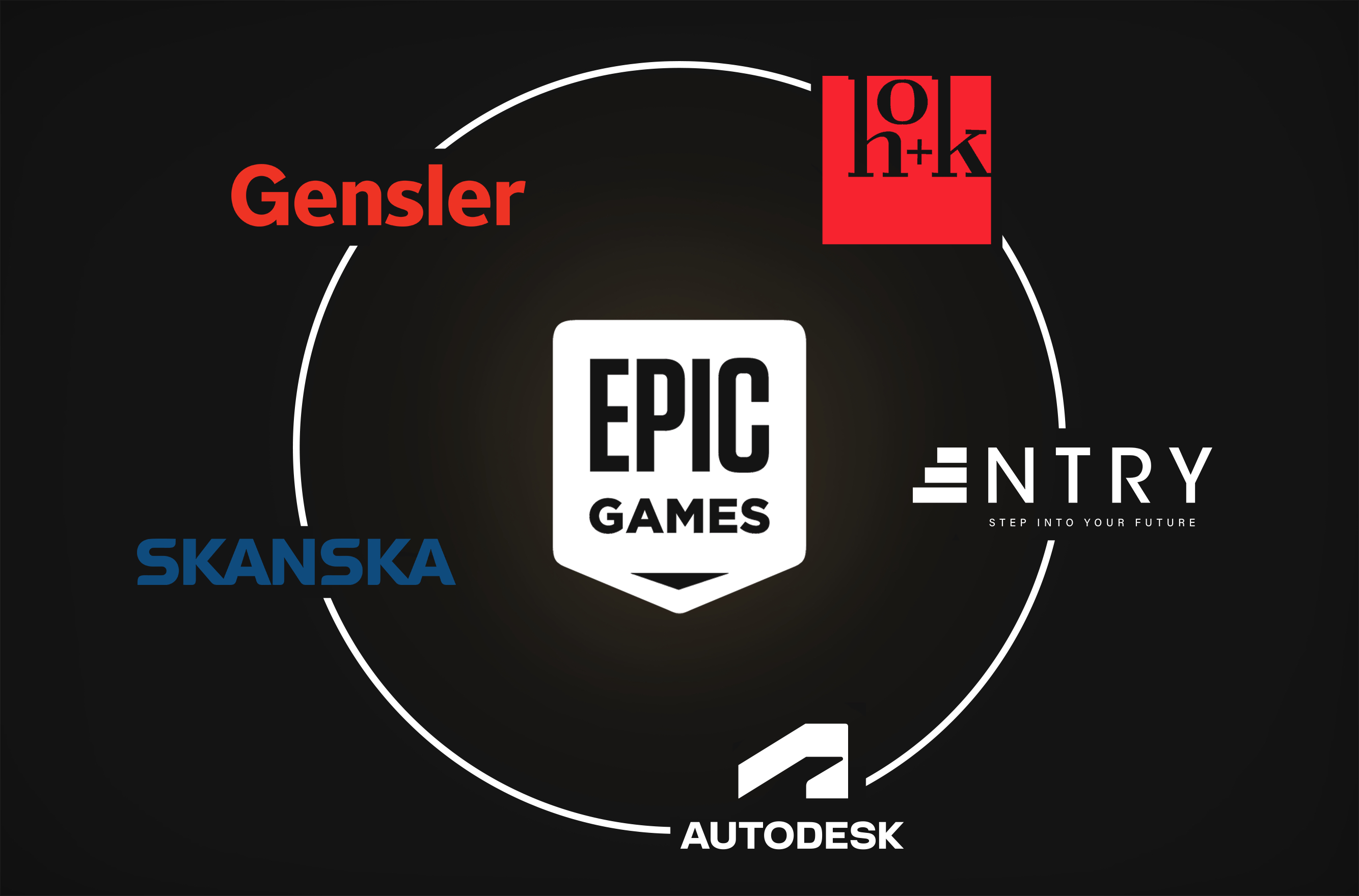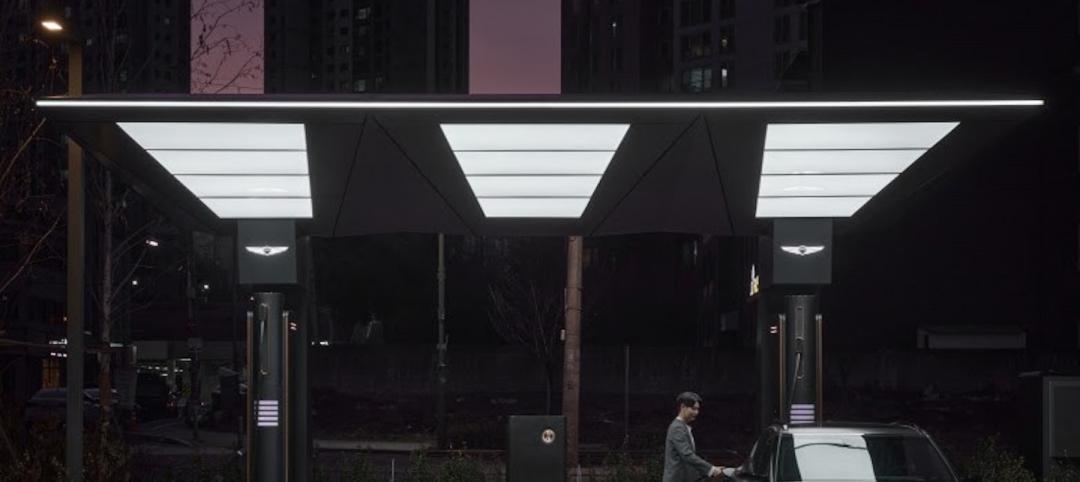Autodesk has announced its collaboration with Epic Games (yes, the people behind Fortnite) to accelerate immersive virtual modeling in the Architecture, Engineering, and Construction (AEC) industry.
What does designing and building homes have to do with video games? Well, Epic Games develops one of the most powerful real-time 3D design tools out there today: Unreal Engine. The latest iteration of the free tool, Unreal Engine 5, utilizes technical achievements to simulate hyper-realistic environments in real-time.
Unreal has already been used across many other industries: film and television, architecture, and even the automotive industry. It seems, though, that more and more AEC firms are beginning to dip their toes into the world of Unreal Engine’s computer-aided design.
AEC INDUSTRY FIRMS USING UNREAL ENGINE
HOK
Architecture firm, HOK, is one company utilizing Epic Games’ technology. Through the power of Unreal Engine alongside Epic Games’ other design tool, Twinmotion (more on that later), HOK is creating virtual reality (VR) walkthroughs to aid in a Canadian architectural renovation project.
These “brick-to-beam” interactive walkthroughs are meant to serve as a preview of what Canada’s iconic Centre Block will look like for years to come. HOK finds that using computer-aided design for this project is beneficial, as clients can clearly see what they like and don’t like about the model—all before spending billions of dollars on the project.
Skanska
Skanska Sweden used Unreal Engine with 3ds Max during the development of a 700,000 square-foot research facility in 2019. The firm leveraged the 3D modeling tools to create VR renderings of the project, as well as high-quality visualizations with realistic lighting scenarios.
“Using 3D tracking with a drone enabled us to visualize the 3D-modeled designs in actual surroundings, many years prior to completion,” says Ronald Cruz, BIM coordinator, Sweco Architects. “Rendered contents from 3ds Max proved beneficial regarding the communications between design, contractors, stakeholders, and the board of directors.”
VIRTUAL REAL ESTATE WITH UNREAL ENGINE 5
NTRY
NTRY, a Canadian cloud-based real estate company, has developed a digital tool for buyers to tour properties in the real estate market. Touting itself as the first real estate metaverse, NTRY utilizes the power of 3D CityScapes—powered by Unreal Engine—which specializes in creating digital interactive environments.
NTRY’s web-based tool—aimed mostly at brokers, agents, developers, and buyers—grants users the ability to access online virtual showings from anywhere in the world. Realtors are able to show clients multiple on-the-market homes from the comfort of their office.
This allows prospective buyers to “experience the heights of a downtown condo, the quietude of the suburbs, or walk through the bustling city streets,” according to NTRY. The tool includes the ability to change finishes and design choices in real-time, like swapping out a marble countertop for granite, for example.
V2i Realtime
Another beneficial use of Unreal Engine is being able to properly showcase the size and scale of projects. V2i Realtime is another company doing such things, consolidating all of a project’s data into a single 3D environment.
What this means, then, is that stakeholders and clients are able to explore the digital space from any device with a web browser. This is done through Pixel Streaming, in which visual “noise” (that can lead to misinterpretation, errors, and confusion) is reduced.
“Unreal Engine eliminates so much wasted time, energy, and dollars that we often see as a result of the need for third-party interpretation of traditional, and often technical, 2D data and reports,” says Luke Brannelly, founder, managing director, and creative director at V2i Realtime.
EPIC GAMES’ TWINMOTION TOOL
Autodesk
Epic Games has more tools than Unreal, too. In its recent partnership with Autodesk, Epic Games is giving those with Revit subscriptions the ability to access Epic’s other tool, Twinmotion, for free.
The two companies believe this integration between Autodesk Revit and Twinmotion will allow users to spend more time bringing their design ideas to life, and “less time handling complex data and technical workflows,” according to Marc Petit, vice president, Unreal Engine Ecosystem at Epic Games.
But what makes Twinmotion different from Unreal Engine?
Twinmotion
While Unreal marries real-time design with user interactivity, Twinmotion largely focuses on creating visualizations to be exported as images or 360 degree video. Though Twinmotion is powered by Unreal Engine, it’s built to be used more frequently by architects, urban planners, landscaping professionals, and even consumer product designers.
Epic Games touts Twinmotion’s “one-click sync” capability—being able to easily import designs from Revit, SketchUp Pro, Archicad, BricsCAD, Rhino, Vectorworks, and more.
With the new Autodesk partnership, Revit subscribers can now launch Twinmotion directly from the Revit ribbon.
WHAT IS THE BENEFIT OF COMPUTER-AIDED DESIGN?
There are dozens of other AEC and real estate firms not listed here that utilize Epic Games’ technology for their businesses. From Gensler to Foster+Partners, it seems more and more companies are adding tools like Unreal Engine to their design arsenal.
However, there’s a reason not every company is quickly jumping into the world of Unreal. Though Epic’s tools are designed to be intuitive, it still takes time and practice to transition workflows from software to software. Most firms may not have the financial resources to train people on Twinmotion/Unreal Engine. Plus, real-time high-quality virtualization doesn’t come cheap, as a decently high-powered computer needs to be used to get the full benefits of the software.
But when it is used, computer-aided design can prove to be a powerful visualization tool that aids in communication, clarity, and productivity.
Related Stories
AEC Tech | Apr 13, 2022
Morphosis designs EV charging station for automaker Genesis
LA-based design and architecture firm Morphosis has partnered with automotive luxury brand Genesis to bring their signature brand and styling, attention-to-detail, and seamless customer experience to the design of Electric Vehicle Charging (EVC) Stations.
AEC Tech | Apr 13, 2022
A robot automates elevator installation
Schindler—which manufactures and installs elevators, escalators, and moving walkways—has created a robot called R.I.S.E. (robotic installation system for elevators) to help install lifts in high-rise buildings.
Hotel Facilities | Apr 12, 2022
A virtual hotel to open in the metaverse
A brand of affordable luxury hotels that launched in 2008, citizenM has announced it will purchase a digital land site in The Sandbox, a virtual game world owned by Animoca Brands.
Modular Building | Mar 31, 2022
Rick Murdock’s dream multifamily housing factory
Modular housing leader Rick Murdock had a vision: Why not use robotic systems to automate the production of affordable modular housing? Now that vision is a reality.
AEC Tech Innovation | Mar 9, 2022
Meet Emerge: WSP USA's new AEC tech incubator
Pooja Jain, WSP’s VP-Strategic Innovation, discusses the pilot programs her firm’s new incubator, Emerge, has initiated with four tech startup companies. Jain speaks with BD+C's John Caulfield about the four AEC tech firms to join Cohort 1 of the firm’s incubator.
AEC Tech | Feb 11, 2022
Trimble Dimensions+ 2022 Call for Speakers Now Open
Trimble has opened its Call for Speakers for the Trimble Dimensions+ 2022 User Conference, which will be held November 7-9 at the Venetian Resort in Las Vegas.
Coronavirus | Jan 20, 2022
Advances and challenges in improving indoor air quality in commercial buildings
Michael Dreidger, CEO of IAQ tech startup Airsset speaks with BD+C's John Caulfield about how building owners and property managers can improve their buildings' air quality.
Architects | Dec 20, 2021
Digital nomads are influencing design
As our spaces continue to adapt to our future needs, we’ll likely see more collaborative, communal zones where people can relax, shop, and work.
AEC Tech | Dec 16, 2021
Autodesk to Acquire Cloud Based Estimating Company ProEst
Autodesk, Inc. is acquiring ProEst, a cloud-based estimating solution that enables construction teams to create estimates, perform digital takeoffs, generate detailed reports and proposals and manage bid-day processes. Autodesk plans to integrate ProEst with Autodesk Construction Cloud, a comprehensive construction management platform connecting teams, data and workflows across the entire building lifecycle.
Urban Planning | Dec 15, 2021
EV is the bridge to transit’s AV revolution—and now is the time to start building it
Thinking holistically about a technology-enabled customer experience will make transit a mode of choice for more people.
















